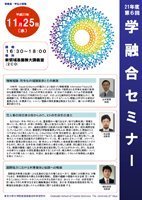AY2009 6th Gakuyugo Seminar
- Date&Time:
- Nov 25, 2009 16:30~18:00
- Venue:
- Large Lecture Room (2C0), New Frontier Science Bldg.

Information Theory: Theoretical Limits of Coding and Its Realization
Professor Hirosuke Yamamoto
Information theory, which began with a paper by Claude E. Shannon in 1948, is the basic mathematical theory of coding techniques used for data compression, error correction, information security, and other purposes. These coding technologies are used in almost all communication systems and recording devices (CD-ROM, DVD, etc.). In addition to the development of such practical codes, the research called "Shannon theory" is important in information theory to clarify the theoretical limit of coding efficiency. In this talk, I will explain the significance of the research on Shannon theory and introduce some research results.

Evolution of human life history from the perspective of isotope analysis of ancient human bones
Associate Professor Minoru Yoneda
We humans (Homo sapiens), as a species of primate, have a variety of interesting characteristics. For example, our highly diverse diet has allowed us to adapt to a variety of environments. They also seem to be able to wean and shorten the lactation period thanks to their food preparation skills. This may be one of the reasons why farmers have been more successful in increasing their population than hunter-gatherers. When and how did humans acquire such a special diet in the course of evolution? We are conducting research to reconstruct the dietary habits of people in the past using human bones excavated from archaeological sites. The carbon and nitrogen isotope ratios of the protein and collagen in the bones can give us an overview of the food resources used by people in the past. For example, analysis of human bones from the Jomon period in various parts of Japan has shown that the same Jomon culture had a diverse diet that adapted to the surrounding environment. In addition, analysis of infants has allowed us to reconstruct past breastfeeding habits, and we are obtaining data on the breastfeeding period of Jomon period people. This time, I would like to consider the peculiarities and commonalities of humans as primates from the perspective of dietary ecology.

Conflicts of Interest and Strategies for Collaboration in International Cooperation
Associate Professor Masahide Horita
While international cooperation projects are opportunities for mutually beneficial cooperation among countries, in reality they are also opportunities for conflict of interest. It is a major objective of conflict management to understand the different interests of the parties involved in the project, and to share conflicting perceptions and values with each other. In this seminar, we will present the results of our research on the visualization of argument structures including conflicts of interest and the development of a support system for environmental and social considerations using natural language processing technology.
*The contents of this page were developed based on a machine translation.

